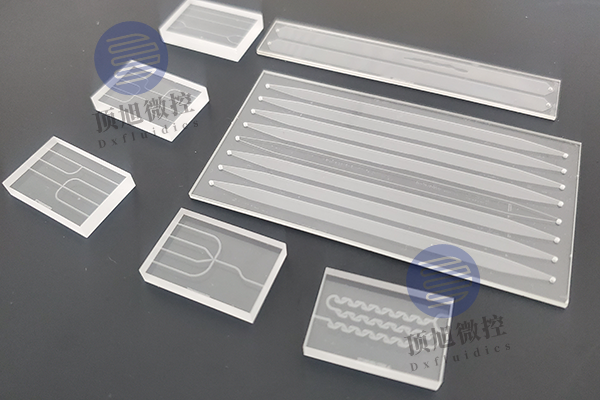Glass chips are an important tool in microfluidic technology, employing glass as the fabrication material for the chips. Compared to conventional polymer chips, glass chips offer excellent optical transparency, chemical inertness, thermal stability and biocompatibility.
These properties make glass chips widely used in life science research, medical diagnosis and drug screening. The preparation process of glass chips is diverse, and tiny structures and microchannels can be precisely fabricated by micromachining, chemical etching and other methods to realize the integration of microfluidic systems.
Its highly controllable preparation process provides a more stable and reliable platform for experiments, while its transparency facilitates real-time observation of cells, particles or biochemical reactions within the microfluidics, providing an advanced and reliable solution for microfluidics applications.

1 Glass Chip Materials
Characteristics:
1 Superior optical transparency: Facilitates optical detection and observation.
2 Excellent corrosion resistance: Can withstand the corrosion of various acids, alkalis, and organic solvents, suitable for various chemical experiments and analyses.
3 Biocompatibility: Suitable for applications such as biological analysis and cell culture.
4 High-temperature resistance: Suitable for high-temperature reactions and thermal cycling experiments.
5 Processable: Glass material can undergo high-precision processing and micro/nano fabrication to manufacture microchannels and microreactors in microfluidic chips.
| Property | B270 | BF33 | D263 |
| Optical Performance | Exceptional optical transparency | High transmittance, low fluorescence, laser systems | General optical glass, microscope slides, biochips |
| Mechanical Strength | Higher compressive and flexural strength | Average | Average |
| Coefficient of Thermal Expansion | Moderate | Low | Moderate |
| Chemical Stability | Good, can withstand some chemicals | Good, low fluorescence, high corrosion resistance | Good, commonly used in the field of biology |
| Temperature Stability | Moderate | Good | Moderate |
| Complexity of Preparation | Moderate | Moderately difficult to corrode | Moderate |
| Main Application Scenarios | Conventional applications | Applications requiring low fluorescence background and corrosion resistance | biochip |
2 Processing Methods:

| Processing Methods: | Advantages | Disadvantages |
| wet etching | 1)Suitable for the fabrication of microfluidic channels with low cost. 2)Capable of mass production | 1)Uneven etching, prone to undercutting. 2)Chemical liquids are harmful to the environment and require proper disposal. |
| dry etching | 1)Achieves anisotropic and precise etching 2)Suitable for high aspect ratio microstructures. | 1)Low etching rate. 2)Low selective etching. |
| laser fabrication | High preparation efficiency. | 1)Glass is brittle and prone to microcracks. 2)Poor quality of the groove bottom. |
| mechanical fabrication | High preparation efficiency. | 1)Difficult to obtain a smooth processing surface. 2)The size of microstructures is limited by the tools. |
| photostructuring | 1)No need for photoresist layer. 2)Suitable for photosensitive glass. | 1)The preparation time is relatively long. 2)High cost. |
| molding process | Efficient fabrication of microstructures. | Challenges in mold preparation and parameter optimization need to be addressed. |
wet etching
The efficient processing of microfluidic glass chip channels with a depth of 20um or more, and a depth-to-width ratio above 2:1.
The basic process of microfabrication for microfluidic glass chips includes steps such as coating, exposure, development, etching, and de-molding. Wet etching and dry etching can be chosen based on channel requirements. Wet etching exhibits isotropy, while dry etching demonstrates anisotropy. Currently, wet etching of glass is the most widely used method for microfluidic glass chips.
Wet etching process for microfluidic glass chips:

Dxfluidics product ( standard Glass chip)

| Product Code | Outline (mm) | Width (um) | Height (um) | Thickness (mm) | Chip material | Price (CNY) |
| J0001 | 22.5*15 | 105&300 | 50 | 2+2 | BF270 | 1000 |
| J0002 | 22.5*15 | 105 | 50 | 2+2 | BF270 | 1000 |
| J0003 | 22.5*15 | 105&300 | 50 | 2+2 | BF270 | 1000 |
| J0004 | 22.5*15 | 105 | 50 | 2+2 | BF270 | 1000 |
| J0005 | 22.5*15 | 105 | 50 | 2+2 | BF270 | 1000 |
| J0006 | 22.5*15 | 105 | 50 | 2+2 | BF270 | 1000 |
| J0007 | 22.5*15 | 450 | 50 | 2+2 | BF270 | 1000 |
| Chip fixture | / | / | / | Al | 1500 |
Our company also provides customized microfluidic glass chip processing services. For specific details, please feel free to contact us at +86-17751163890 (also available on WeChat) or email:sale@dxfluidics.com.
Ordering Methods



© 2025. All Rights Reserved. 苏ICP备2022036544号-1

.png&w=120&h=120&zc=1&q=100)











